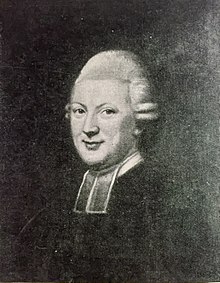Johann Friedrich Zöllner

Johann Friedrich Zöllner (born April 24, 1753 in Neudamm , Neumark , † September 12, 1804 in Berlin ) was a Berlin pastor . His critical question “ What is Enlightenment ? “Of December 1783 in the Berlin monthly magazine, Immanuel Kant's famous work provoked the answer to the question: What is Enlightenment? .
Life and achievement
Zöllner studied theology in Frankfurt an der Oder and was a preacher at the Charité from 1779 . In 1781 he became a preacher at the Marienkirche in Berlin, and in 1788 he became provost at the Nikolaikirche . Zöllner was an active Freemason and in 1798 was elected National Grand Master of the Great National Mother Lodge "To the Three Worlds" .
As an enlightened contemporary , he was a member of the Natural Research Society, since 1791 the Academy of Sciences in Berlin and the Berlin Wednesday Society, a secret association that was committed to the ideas of the Late Enlightenment .
To Zöllner's question "What is Enlightenment?"
In the Berlin monthly magazine, in which I. Kant published his answer to Zöllner's question, Zöllner's poem is Der Affe. A little fable (one page before, page 480) is printed which illustrates the skeptical attitude of Zöllner towards the wish of the Enlightenmentists that the broad public should receive their writings as the Enlightenmentists hoped:
A monkey once set fire to a grove / Of cedars at night / And was then immensely happy / When he found it so bright. / "Come, brothers, see what I can do; / I - I turn night into day!"
The brothers came big and small, / admired the splendor / And everyone began to scream: / Long live brother Hans! / "Hans Affe is worth the posthumous fame, / He has cleared up the area."
Johann Friedrich Zöllner, 1784
This poem in the form of a fable uses the Enlightenment's very own means, the fable, against the Enlightenment. So customs officers beat the scouts with their own weapons. Today we could say that it is ironic and sarcastic at the same time - counter-enlightenment.
Works
- Reading book for all stands. For the promotion of noble principles, genuine taste and useful knowledge , 10 vols., 1781–1804.
- Weekly Conversations on the Earth and Its Inhabitants , 9 vols., 1784–1788; ninth volume from Friedrich Maurer, Berlin 1788
- Weekly Conversations on the Characteristics of Humanity , 6 vols., 1789–1791.
- Zöllner's journey through Pomerania to Rügen and part of the Duchy of Mecklenburg , in 23 letters, 1795.
literature
- Friedrich Wienecke: Zöllner, Johann Friedrich . In: Allgemeine Deutsche Biographie (ADB). Volume 55, Duncker & Humblot, Leipzig 1910, pp. 423-425.
- Meusel: The learned Teutschland or Lexicon of the now living German writers , fifth edition. Volume 8 (1800) pp. 711-714 ( GBS ). Addendum in Volume 10 (1803) p. 858 ( GBS )
Web links
- Literature by and about Johann Friedrich Zöllner in the catalog of the German National Library
- Zöllner's journey through Pomerania to Rügen on lexicus.de
- Short biography and information on the work of Johann Friedrich Zöllner at Literaturport
| personal data | |
|---|---|
| SURNAME | Customs officer, Johann Friedrich |
| BRIEF DESCRIPTION | German pastor |
| DATE OF BIRTH | April 24, 1753 |
| PLACE OF BIRTH | Neudamm , Neumark |
| DATE OF DEATH | September 12, 1804 |
| Place of death | Berlin |